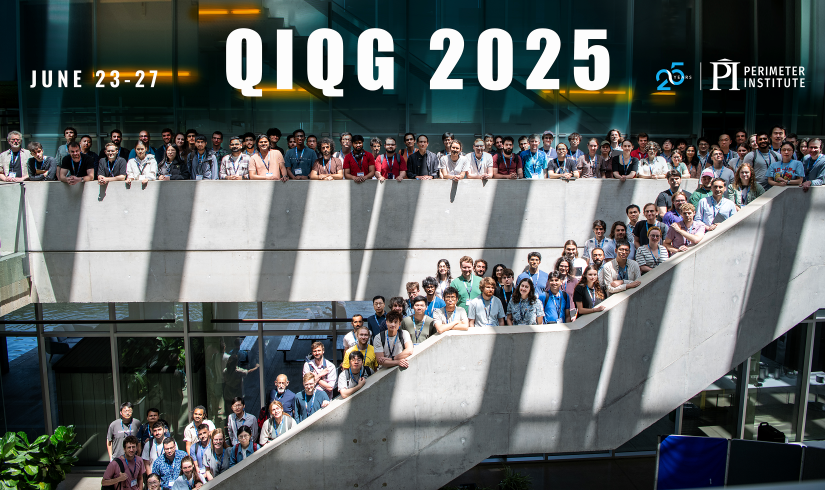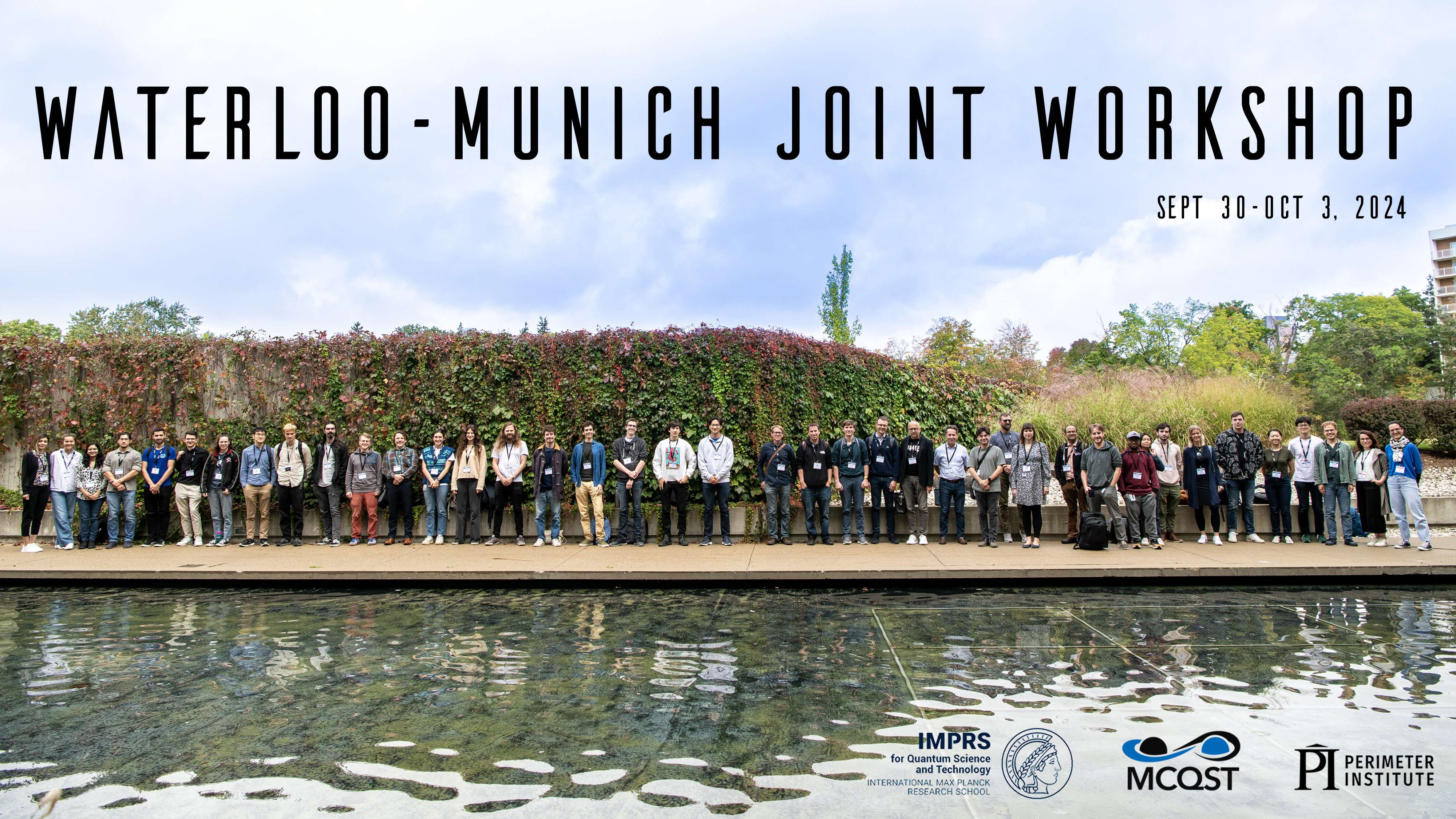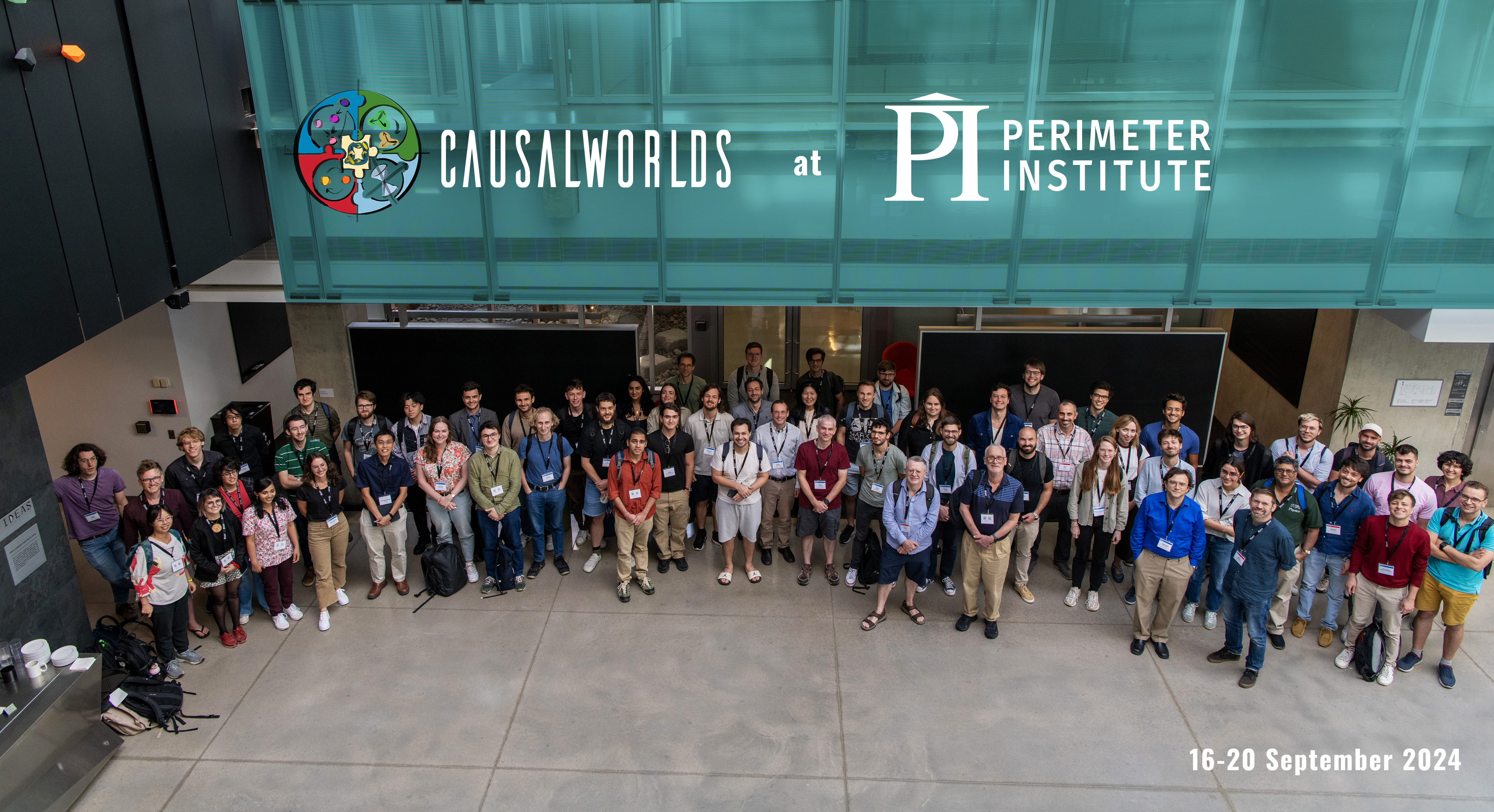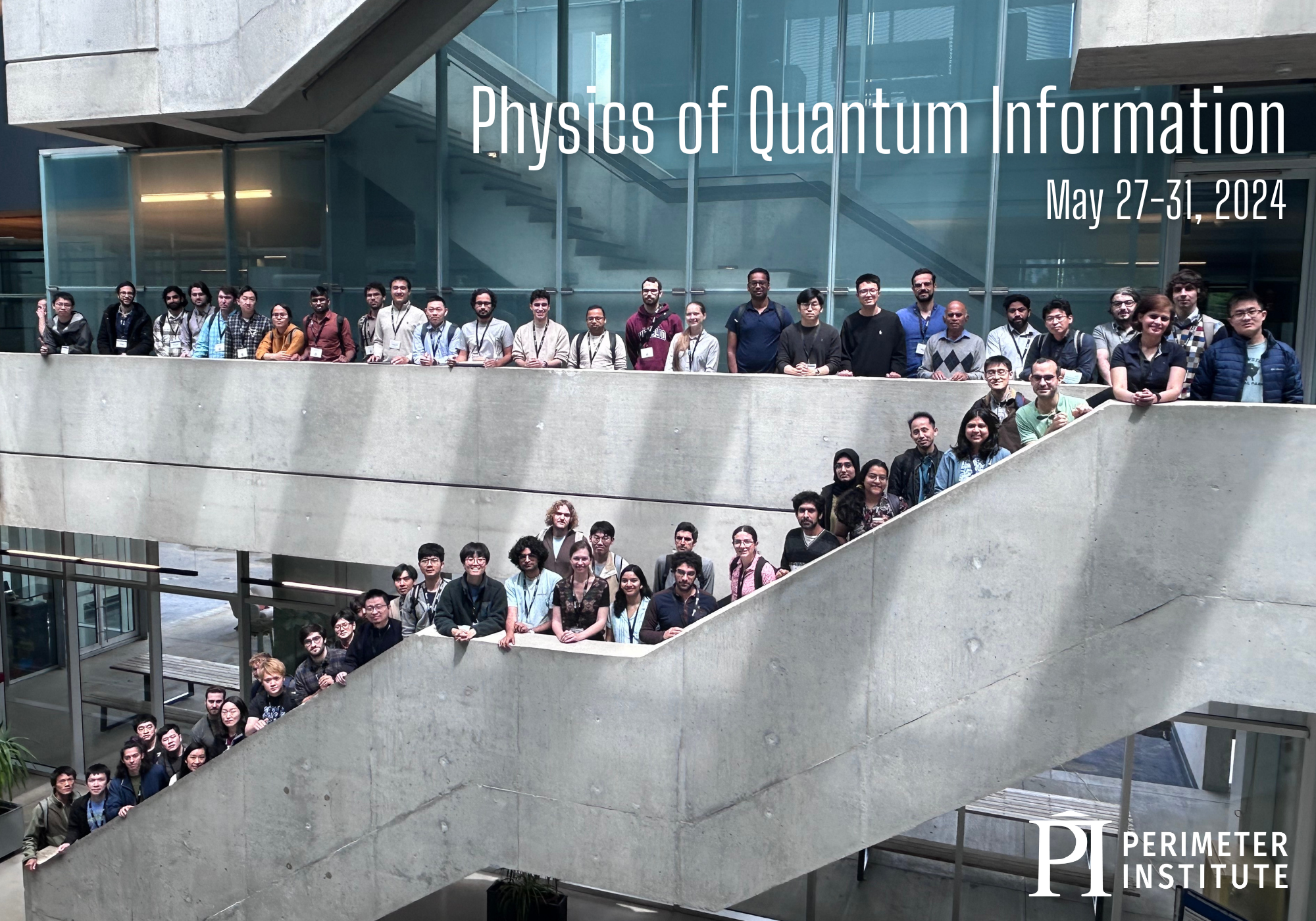Format results
-
Talk
-
-
Topological Quantum Spin Glass Order
Nikolas Breukmann University of Bristol
-
Harnessing qudits for quantum simulations
Christine Muschik Institute for Quantum Computing (IQC)
-
Chiral Color Code : Single-shot error correction for exotic topological order
Dongjin Lee Perimeter Institute for Theoretical Physics
PIRSA:25100151 -
Architectural mechanisms of a universal fault-tolerant quantum computer
Shayan Majidy Harvard University
PIRSA:25100149 -
Decoding Multimode Gottesman-Kitaev-Preskill Codes with Noisy Auxiliaries
Marc-Antoine Roy Université de Sherbrooke
PIRSA:25100150 -
Keynote
John Preskill California Institute of Technology (Caltech) - Division of Physics Mathematics & Astronomy
-
-
-
Talk
-
Talk
-
Student Discussion - Beautiful Papers - PHYS 773, September 12 - December 1, 2025
Pedro Vieira Perimeter Institute for Theoretical Physics
-
Instructor Discussion - Beautiful Papers - PHYS 773, September 12 - December 1, 2025
Pedro Vieira Perimeter Institute for Theoretical Physics
-
Student Discussion - Beautiful Papers - PHYS 773, September 12 - December 1, 2025
Pedro Vieira Perimeter Institute for Theoretical Physics
-
Instructor Discussion - Beautiful Papers - PHYS 773, September 12 - December 1, 2025
Pedro Vieira Perimeter Institute for Theoretical Physics
-
Student Discussion - Beautiful Papers - PHYS 773, September 12 - December 1, 2025
Pedro Vieira Perimeter Institute for Theoretical Physics
-
Instructor Discussion - Beautiful Papers - PHYS 773, September 12 - December 1, 2025
Pedro Vieira Perimeter Institute for Theoretical Physics
-
-
Talk
-
Lecture - Quantum Theory (Core), PHYS 605
Dan Wohns Perimeter Institute for Theoretical Physics
-
Lecture - Quantum Theory (Core), PHYS 605
Dan Wohns Perimeter Institute for Theoretical Physics
-
Lecture - Quantum Theory (Core), PHYS 605
Dan Wohns Perimeter Institute for Theoretical Physics
-
Lecture - Quantum Theory (Core), PHYS 605
Dan Wohns Perimeter Institute for Theoretical Physics
-
Lecture - Quantum Theory (Core), PHYS 605
Dan Wohns Perimeter Institute for Theoretical Physics
-
Lecture - Quantum Theory (Core), PHYS 605
Dan Wohns Perimeter Institute for Theoretical Physics
-
Lecture - Quantum Theory (Core), PHYS 605
Dan Wohns Perimeter Institute for Theoretical Physics
-
Lecture - Quantum Theory (Core), PHYS 605
Dan Wohns Perimeter Institute for Theoretical Physics
-
-
Talk
-
Opening Remarks
-
Marcela Carena Perimeter Institute for Theoretical Physics
-
Emily Petroff Perimeter Institute for Theoretical Physics
-
Chris Waddell Perimeter Institute for Theoretical Physics
-
-
-
Chaos and the Emergence of the Cosmological Horizon
David Kolchmeyer Massachusetts Institute of Technology
-
Operator Algebras and Third Quantization
Nima Lashkari Purdue University West Lafayette
-
Swing Surfaces in AdS/CFT
Sabrina Pasterski Perimeter Institute for Theoretical Physics
-
An Emergent Area Operator in 2d CFT
Ronak Soni Chennai Mathematical Institute
-
Gravity As An Oracle (Vision Talk)
Raphael Bousso University of California, Berkeley
-
Vacuogenesis (Vision Talk)
Ted Jacobson University of Maryland, College Park
-
-
Talk
-
Lecture - Causal Inference, PHYS 777
Robert Spekkens Perimeter Institute for Theoretical Physics
-
Lecture - Causal Inference, PHYS 777
Robert Spekkens Perimeter Institute for Theoretical Physics
-
Lecture - Causal Inference, PHYS 777
Robert Spekkens Perimeter Institute for Theoretical Physics
-
Lecture - Causal Inference, PHYS 777
Robert Spekkens Perimeter Institute for Theoretical Physics
-
Lecture - Causal Inference, PHYS 777
Robert Spekkens Perimeter Institute for Theoretical Physics
-
Lecture - Causal Inference, PHYS 777
Robert Spekkens Perimeter Institute for Theoretical Physics
-
Lecture - Causal Inference, PHYS 777
Robert Spekkens Perimeter Institute for Theoretical Physics
-
Lecture - Causal Inference, PHYS 777
Robert Spekkens Perimeter Institute for Theoretical Physics
-
-
Talk
-
Lecture - Quantum Information, PHYS 635
Alex May Perimeter Institute for Theoretical Physics
-
-
-
-
Lecture - Quantum Information, PHYS 635
Alex May Perimeter Institute for Theoretical Physics
-
-
-
-
-
Talk
-
Lecture - Quantum Foundations, PHYS 639
David Schmid Perimeter Institute for Theoretical Physics
-
Lecture - Quantum Foundations, PHYS 639
Lucien Hardy Perimeter Institute for Theoretical Physics
-
Lecture - Quantum Foundations, PHYS 639
Lucien Hardy Perimeter Institute for Theoretical Physics
-
Lecture - Quantum Foundations, PHYS 639
Lucien Hardy Perimeter Institute for Theoretical Physics
-
Lecture - Quantum Foundations, PHYS 639
Lucien Hardy Perimeter Institute for Theoretical Physics
-
Lecture - Quantum Foundations, PHYS 639
Lucien Hardy Perimeter Institute for Theoretical Physics
-
Lecture - Quantum Foundations, PHYS 639
Lucien Hardy Perimeter Institute for Theoretical Physics
-
Lecture - Quantum Foundations, PHYS 639
Lucien Hardy Perimeter Institute for Theoretical Physics
-
-
Talk
-
Opening Remarks
-
Sonya Gzyl Max Planck Institute of Quantum Optics
-
Timothy Hsieh Perimeter Institute for Theoretical Physics
-
-
-
-
Towards large-scale quantum simulations with trapped ions - Rajibul Islam
Kazi-Rajibul Islam Institute for Quantum Computing (IQC)
-
-
-
-
-
-
Talk
-
-
Tutorial: Causal Inference Meets Quantum Physics
Robert Spekkens Perimeter Institute for Theoretical Physics
-
Counterfactual and Graphical Frameworks for Causal Modeling
Thomas Richardson University of Washington
-
-
Modeling Latent Selection with Structural Causal Models
Leihao Chen University of Amsterdam, Korteweg-de Vries Institute for Mathematics
-
Relating Wigner's Friend Scenarios to Nonclassical Causal Compatibility, Monogamy Relations, and Fine Tuning
Yìlè Yīng Perimeter Institute for Theoretical Physics
-
-
Zero Inflation as a Missing Data Problem: a Proxy-based Approach
Trung Phung Johns Hopkins Whiting School of Engineering
-
-
Talk
-
Lecture - Quantum Theory, PHYS 605
Dan Wohns Perimeter Institute for Theoretical Physics
-
Lecture - Quantum Theory, PHYS 605
Dan Wohns Perimeter Institute for Theoretical Physics
-
Lecture - Quantum Theory, PHYS 605
Dan Wohns Perimeter Institute for Theoretical Physics
-
Lecture - Quantum Theory, PHYS 605
Dan Wohns Perimeter Institute for Theoretical Physics
-
Lecture - Quantum Theory, PHYS 605
Dan Wohns Perimeter Institute for Theoretical Physics
-
Lecture - Quantum Theory, PHYS 605
Dan Wohns Perimeter Institute for Theoretical Physics
-
Lecture - Quantum Theory, PHYS 605
Dan Wohns Perimeter Institute for Theoretical Physics
-
Lecture - Quantum Theory, PHYS 605
Bindiya Arora Guru Nanak Dev University
-
-
Talk
-
-
Repetition Code Revisited
Matthew Fisher University of California, Santa Barbara
-
-
Stability of mixed-state quantum phases via finite Markov length
Shengqi Sang Stanford University
-
The rise and fall of mixed-state entanglement: measurement, feedback, and decoherence
Tsung-Cheng Lu (Peter) University of Maryland, College Park
-
Universal bound on topological gap
Liang Fu Massachusetts Institute of Technology (MIT) - Department of Physics
-
Mapping ground states to string-nets
Daniel Ranard California Institute of Technology (Caltech)
-
Sequential Quantum Circuit
Xie Chen California Institute of Technology
-
-
Year of Quantum Across Canada

Year of Quantum Across Canada: From Fundamental Science to Applications
The Institute for Quantum Computing and the Perimeter Institute for Theoretical Physics will jointly host a meeting celebrating the 100 year anniversary of the discovery of quantum mechanics.
The conference will celebrate and aim to strengthen the quantum information science community in Canada and beyond, by bringing together leading Canadian researchers as well as members of the broader quantum community. The program will highlight the fundamental advances being made in quantum information theory and how these advances lead to applications.Topics included in the program will include:
- Quantum metrology
- Quantum simulation and quantum advantage
- Quantum error-correction and fault tolerance
- Quantum complexity and algorithms
- Quantum communication and networks
- Quantum cryptography
- Quantum information in quantum matter and quantum gravity
Participation is open to all scientists who are interested in the conference topics.:: :: ::
Speakers
Christian Bauer (Lawrence Berkeley National Laboratory)
Alexandre Blais (Université de Sherbrooke)
Sergey Bravyi (IBM Research - Thomas J. Watson Research Center)
Nikolas Breuckmann (University of Bristol)
Eric Chitambar (University of Illinois at Urbana-Champaign)
Soonwon Choi (MIT)
Zohreh Davoudi (University of Maryland)
Matthew Fisher (University of California, Santa Barbara)
Dakshita Khurana (University of Illinois Urbana-Champaign)
Aleksander Kubica (Yale University)
Hank Lamm (Fermilab)
Laura Mancinska (University of Copenhagen)
Antonio Mezzacapo (IBM)
John Preskill (Caltech)
Martin Savage (University of Washington)
Brian Swingle (Brandeis University)
Nathan Wiebe (University of Toronto)
Yu-Xiang Yang (The University of Hong Kong)Co-Chairpersons
Marcela Carena (Perimeter Institute & University of Chicago & Fermilab)
Norbert Lütkenhaus (University of Waterloo, Institute for Quantum Computing)Scientific Organizers and Convenors
Alexandre Blais (Université de Sherbrook)
Anne Broadbent (University of Ottawa)
Shohini Ghose (Wilfrid Laurier University & Quantum Algorithms Institute)
David Gosset (University of Waterloo, IQC, Perimeter Institute)
Tim Hsieh (Perimeter Institute)
Ray Laflamme (University of Waterloo, IQC)
Alex May (Perimeter Institute)
Christine Muschik (University of Waterloo, IQC, Perimeter Institute)
John Preskill (CalTech)
Barry Sanders (University of Calgary & Quantum City)
Aephraim Steinberg (University of Toronto, CQIQC)
Beni Yoshida (Perimeter Institute)
Peter Zoller (University of Innsbruck & IQOQI)
Sisi Zhou (Perimeter Institute) -
Introduction to Categorical Probability Mini-Course, Oct 1-7, 2025
In the last few years, a new perspective on probabilistic reasoning has been extensively developed with the help of tools from category theory. The idea is to shift focus from the measure-theoretic details to structural properties of information flow in the presence of uncertainty - independence, conditioning, nested uncertainty, etc. This shift allows one to reason without the need to specify a concrete model of uncertainty, be it discrete, continuous, Gaussian, possibilistic or one of many other instantiations. In this course I will present a high-level overview of the leading approach to categorical probability that is based on so-called Markov categories. We will focus on the diagrammatic language of Markov categories that can be understood without any knowledge of category theory. Using such diagrams, we can also express basic concepts that have been useful in proving a plethora of categorical versions of classical theorems - strong law of large numbers, de Finetti's theorem, d-separation criterion for Bayesian networks, ergodic decomposition theorem, zero/one laws and others.
Location & Building Access: Alice Room, 3rd Floor, Perimeter Institute, 31 Caroline St N, Waterloo
Participants who do not have an access card for Perimeter Institute must sign in at the security desk before each session. For information on parking or accessibility please contact academic@perimeterinstitute.ca.
To request the Zoom link for online participation contact yying@perimeterinstitute.ca.
-
Beautiful Papers, PHYS 773, September 12 - December 1, 2025
Scroll down to Registration and Enrollment to participate.
Structure:
We will discuss 8 papers which had huge impact in physics. One week Instructor Pedro Vieira will discuss a paper; students should read it beforehand. One week later students discuss recent papers referring to that paper (20 min each student, ~ 3 presentations; at the end of the class Pedro will grade the presentations based on “Physics”, “Presentation”, “Question handling”; and give comments).
By the end of the course, students will have explored a vast set of topics in theoretical physics — spotting potential gaps to be fixed — sharpened their presentation skills through steady practice, and sparked cross-disciplinary conversations through our shared physics language.
Familiarity with Quantum Field Theory and General Relativity is assumed.
The papers:
Sept 12 & 19: On the Quantum Correction for Thermodynamic Equilibrium, Wigner, 1932 Topic: Quantum Mechanics
Sept 22 & 29: Existence theorem for certain systems of nonlinear PDEs, Foures-Bruhat, 1952 Topic: General relativity
Oct 3 & 10: The Renormalization Group and the Epsilon Expansion, Wilson and Kogut, 1973 Topic: Quantum Field Theory
Oct 10 (EXTRA) & 17: More about the Massive Schwinger Model, Coleman, 1976 Topic: 2D Quantum Field Theory
Oct 20 & 27: A sequence of approximated solutions to the S-K model for spin glasses, Parisi, 1980 Topic: Statistical Mechanics
Oct 31 & Nov 7: Quantum Field Theory and the Jones Polynomial, Witten, 1988 Topic: Topological Quantum Field Theory
Nov 10 & 17: Exactly Solvable Field Theories of Closed Strings, Brezin, Kazakov, 1989 Topic: 2D Quantum Gravity
Nov 21 & Nov 28: Unpaired Majorana fermions in quantum wires, Kitaev, 2000 Topic: Quantum Matter/Quantum Information
Schedule: This is a Friday / Monday alternating week schedule from 915am-1045am.
Exceptions: There will be an afternoon session at 130pm on Friday October 10 to avoid the Thanksgiving holiday.
Location & Building Access: Alice Room, 3rd Floor, Perimeter Institute, 31 Caroline St N, Waterloo Participants who do not have an access card for Perimeter Institute must sign in at the security desk before each session. For information on parking or accessibility please contact academic@perimeterinstitute.ca.
Registration and Enrollment: Please sign-up here: https://forms.office.com/r/nDQ6SDxSR4
Zoom Link https://pitp.zoom.us/j/95238695187?pwd=G6EjbywTpOagSxpbMZtgznxmuwFFBp.1
-
QIQG 2025

QIQG 2025: Quantum Information in Quantum Gravity
QIQG 2025: Quantum Information In Quantum Gravity will unite researchers working at the intersection of quantum information theory and quantum gravity, to exchange insights and showcase recent developments bridging these fields. As part of the celebrations of Perimeter’s 25th anniversary, we will also feature vision talks by world-leading experts exploring pivotal and emerging themes at the nexus of quantum information and quantum gravity. Our program will span topics such as:- Algebraic approaches to field theory and gravity
- Observers, quantum reference frames, and relational observables
- Quantum focussing and the Generalized Second Law
- SYK and its double-scaled limit
- The quantum information theoretic structure of spacetime
- Edge modes and entanglement entropy across subregions
- The role of complexity in field theory and gravity
- The black-hole information puzzle and related issues
- Quantum error-correcting codes in quantum field theory and quantum gravity
- Quantum cryptography and its implications for gravity
- Gravitational wormholes and their information-theoretic implications
- Chaos and thermalization in many-body systems and their realization in quantum gravity
- Holographic cosmology and de Sitter space
:: :: ::
Scientific Organizers
Luca Ciambelli (Perimeter Institute)
Rob Myers (Perimeter Institute)
Chris Waddell (Perimeter Institute)
Beni Yoshida (Perimeter Institute)
-
Causal Inference (Elective), PHYS 777, March 31 - May 2, 2025
Can the effectiveness of a medical treatment be determined without the expense of a randomized controlled trial? Can the impact of a new policy be disentangled from other factors that happen to vary at the same time? Questions such as these are the purview of the field of causal inference, a general-purpose science of cause and effect, applicable in domains ranging from epidemiology to economics. Researchers in this field seek in particular to find techniques for extracting causal conclusions from statistical data. Meanwhile, one of the most significant results in the foundations of quantum theory—Bell’s theorem—can also be understood as an attempt to disentangle correlation and causation. Recently, it has been recognized that Bell’s result is an early foray into the field of causal inference and that the insights derived from almost 60 years of research on his theorem can supplement and improve upon state-of-the-art causal inference techniques. In the other direction, the conceptual framework developed by causal inference researchers provides a fruitful new perspective on what could possibly count as a satisfactory causal explanation of the quantum correlations observed in Bell experiments. Efforts to elaborate upon these connections have led to an exciting flow of techniques and insights across the disciplinary divide. This course will explore what is happening at the intersection of these two fields. Instructor: Robert Spekkens/Bindiya Arora Students who are not part of the PSI MSc program should review enrollment and course format information here: https://perimeterinstitute.ca/graduate-courses -
Quantum Information (Elective), PHYS 635, February 24 - March 28, 2025
We look to understand the possibilities and limits of quantum information processing, and how an information theory perspective can inform theoretical physics. Topics covered include: entanglement, tools for measuring nearness of quantum states, characterizing the most general possible quantum operations, entropy and measuring information, the stabilizer formalism, quantum error-correcting codes, the theory of computation, quantum algorithms, classical and quantum complexity. Instructor: Alex May/Bindiya Arora Students who are not part of the PSI MSc program should review enrollment and course format information here: https://perimeterinstitute.ca/graduate-courses -
Quantum Foundations (Elective), PHYS 639, January 6 - February 5, 2025
This course will cover the basics of Quantum Foundations under three main headings. Part I – Novel effects in Quantum Theory. A number of interesting quantum effects will be considered. Interferometers: Mach-Zehnder interferometer, Elitzur-Vaidman bomb tester, The quantum-Zeno effect. The no cloning theorem. Quantum optics (single mode). Hong-Ou-Mandel dip. Part II - Conceptual and interpretational issues. Axioms for quantum theory for pure states: Von-Neumann measurement model. * The measurement (or reality) problem. EPR Einstein’s 1927 remarks, the Einstein-Podolsky-Rosen argument. Bell’s theorem, nonlocality without inequalities. The Tirolson bound. The Kochen-Specker theorem and related work by Spekkens On the reality of the wavefunction: Epistemic versus ontic interpretations of the wavefunction and the Pusey-Barrett-Rudolph theorem proving the reality of the wave function. Gleason’s theorem. Interpretations. The landscape of interpretations of quantum theory (the Harrigen Spekkens classification). The de Broglie-Bohm interpretation, the many worlds interpretation, wave- function collapse models, the Copenhagen interpretation, and QBism. Part III - Structural issues. Reformulating quantum theory: we will look at some reformulations of quantum theory and consider the light they throw on the structure of quantum theory. These may include time symmetric quantum theory and weak measurements (Aharonov et al), quantum Bayesian networks, and the operator tensor formalism. Generalised probability theories: These are more general frameworks for probabilistic theories which admit classical and quantum as special cases. Reasonable principles for quantum theory: we will review some of the recent work on reconstructing quantum theory from simple principles. Indefinite causal structure and indefinite causal order. Finally we will conclude by looking at (i) the close link between quantum foundations and quantum information and (ii) possible future directions in quantum gravity motivated by ideas from quantum foundations. Instructor: Lucien Hardy/Bindiya Arora Students who are not part of the PSI MSc program should review enrollment and course format information here: https://perimeterinstitute.ca/graduate-courses -
Waterloo-Munich Joint Workshop

Join us for a pioneering joint workshop between renowned research institutions in Munich and Waterloo! This exciting event will focus on the topic of quantum simulation, with additional talks delving into various subjects of quantum science and technology. Designed to include researchers across different levels, from group leaders, postdoctoral fellows, and PhD students, this inaugural collaboration aims to unite scientists from both locations, fostering valuable networking opportunities and promoting interdisciplinary collaboration. Don't miss this extraordinary opportunity to connect, exchange ideas, and shape the future of quantum research together!

-
Causalworlds
Understanding causality is fundamental to science and inspires wide-ranging applications, yet there are several distinct notions of causation. Recently, there have been important developments on the role of causality in quantum physics, relativistic physics and their interplay. These have unearthed a plethora of fascinating open questions regarding the nature of causation, emergence of space-time structure and the limits of quantum information processing. At the same time, causal reasoning has become an important tool in machine learning and statistics, with applications ranging from big data to healthcare. This conference brings together experts from different areas of physics working on questions related to causality, as well as selected researchers who bridge the gap between fundamental research and current industrial applications. The aim of the conference is to provide a venue for cross-pollination of these ideas through scientific exchange between these communities. The conference will focus on the following facets of causality:
• Quantum and classical causal inference
• Indefinite causal order and quantum reference frames
• Causality in quantum field theory and quantum gravity
• Experiments and applications of causality


:: :: ::
Important dates
Paper submission deadline: 24 May 2024 // 31 May 2024
Paper notification: 3 July 2024Registration deadline (with application for financial assistance): 18 July 2024
Registration deadline: 28 August 2024
Conference: 16-20 September 2024Update: The submission deadline has been extended to 31st May 2024 for
papers which clearly justify their relevance for the following three
topics:1) classical causal inference,2) causality in relativistic physics (including quantum field theory and quantum gravity) and3) experiments in causality.As we have received a sufficiently high number of submissions on the remaining topics (particularly indefinite causality and quantum causal models), the original deadline of 24th May still holds for submissions in this category.:: :: ::
Call for Abstracts
Prospective speakers can submit a paper for a contributed talk (in person or online) and/or a poster (in person only) via the Call for Abstracts. The Call for Abstracts is now open! Submissions for a talk will automatically be considered for a poster if not accepted for a talk.:: :: ::
Invited Speakers
Jessica Bavaresco (University of Geneva)
Cyril Branciard (CNRS, University Grenoble Alpes)
Rafael Chaves (Federal University of Rio Grande do Norte)
Giulio Chiribella (The University of Hong Kong)
Doreen Fraser (University of Waterloo)
Anne-Catherine de la Hamette (IQOQI Vienna)
Ciarán Lee (Spotify)
Tein van der Lugt (University of Oxford)
Joris M. Mooij (University of Amsterdam)
Mio Murao (University of Tokyo)
Alejandro Pozas-Kerstjens (University of Geneva)
Huw Price (Trinity College, Cambridge)
Renato Renner (ETH Zürich)
Thomas Richardson (University of Washington)
Sally Shrapnel (The University of Queensland)
Sumati Surya (Raman Research Institute)
Rainer Verch (University of Leipzig)
:: :: ::
Programme Committee
V Vilasini (ETH Zürich & Inria, University Grenoble Alpes) (PC Chair)
Augustin Vanrietvelde (Télécom Paris) (PC Co-chair)
Alastair Abbott (Inria, University Grenoble Alpes)
Časlav Brukner (IQOQI Vienna & University of Vienna)
Eric Cavalcanti (Griffith University)
Chris Fewster (University of York)
Lucien Hardy (Perimeter Institute)
Hlér Kristjánsson (Perimeter Institute & IQC & Université de Montréal)
Giulia Rubino (University of Bristol)
Nitica Sakharwade (Università degli Studi di Napoli Federico II)
Robert Spekkens (Perimeter Institute)
Jacopo Surace (Perimeter Institute)
Elie Wolfe (Perimeter Institute)
Lin-Qing Chen (ETH Zürich & IQOQI Vienna)
Hippolyte Dourdent (ICFO Barcelona)
Tamal Guha (University of Hong Kong)
Robin Lorenz (Quantinuum, Oxford)
Maria Papageorgiou (IQOQI Vienna)
Nicola Pinzani (Université libre de Bruxelles)
Marco-Túlio Quintino (Sorbonne Université, Paris)
Marc-Olivier Renou (Inria Paris-Saclay & CPHT, École polytechnique)
David Schmid (ICTQT, University of Gdańsk)
John Selby (ICTQT, University of Gdańsk)
Akihito Soeda (National Institute of Informatics, Tokyo)
Matthew Wilson (University College London)
:: :: ::
Scientific Organizers
Hlér Kristjánsson (Perimeter Institute & IQC & Université de Montréal) (Chair)
V Vilasini (ETH Zürich & Inria, University Grenoble Alpes)
Robert Spekkens (Perimeter Institute)
Lucien Hardy (Perimeter Institute)
Elie Wolfe (Perimeter Institute)
Jacopo Surace (Perimeter Institute)
Marina Maciel Ansanelli (Perimeter Institute)
Yìlè Yīng (Perimeter Institute)
María Ciudad Alañón (Perimeter Institute)
Daniel Centeno Díaz (Perimeter Institute)
Khushi Gandhi (Perimeter Institute & University of Waterloo):: :: ::
Previous editions:
Causalworlds 2022: The interface between quantum and relativistic causality, foundations and practicalities
Organised at ETH Zürich in 2022. Website: https://causalworlds.ethz.ch/" -
Quantum Theory (Core), PHYS 605, September 3 – October 4, 2024
The aim of the first part is to present a brief overview of selected topics in quantum theory. Schrodinger, Heisenberg and Interaction picture is discussed and applied to study time evolution. Density matrix and Feynman path integral are introduced. The second part of the course derives the Feynman rules for scalar quantum field theory and introduces renormalization. Instructor: Bindiya Arora / Dan Wohns Students who are not part of the PSI MSc program should review enrollment and course format information here: https://perimeterinstitute.ca/graduate-courses -
Physics of Quantum Information
The dialogue between quantum information and quantum matter has fostered notable progress in both fields. Quantum information science has revolutionized our understanding of the structure of quantum many-body systems and novel forms of out-of-equilibrium quantum dynamics. The advances of quantum matter have provided novel paradigms and platforms for quantum information processing.
This conference aims to bring together leading experts at the intersections of quantum information and quantum matter. Key topics include: (i) quantum error correction, (ii) quantum dynamics, and (iii) quantum simulation.Organizers:
Timothy Hsieh, Perimeter Institute
Beni Yoshida, Perimeter Institute
Zhi Li, Perimeter Institute
Tsung-Cheng Lu, Perimeter Institute
Meenu Kumari, National Research Council Canada:: :: ::



.png)